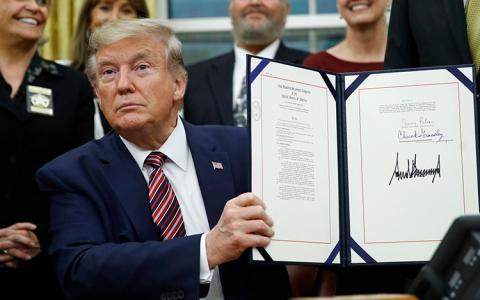
The executive order and accompanying memoranda signed by Donald Trump are receiving a negative response because many feel that they don’t do enough to help the millions of Americans who are struggling in the midst of the pandemic.
Democratic politicians are attacking the lack of funding for expanded testing, which medical experts agree are key to slowing the spread of the deadly virus. But for the millions of Americans struggling to pay their rent on time, the lack of stimulus checks is a gut punch. Congress has been negotiating a stimulus relief bill over the past several weeks, and both sides have acknowledged that a second round of $1,200 stimulus checks is necessary.
The latest data released by the Bureau of Labor Statistics shows that over 16 million Americans are still unemployed. Millions of workers in the hospitality, restaurant, and travel industries have no idea when they will be able to return to work as the pandemic has crushed their industries. There are currently over 30 million people receiving unemployment benefits.
One of Trump’s measures calls for the $600 unemployment benefit to be reduced to $400 a week. The extra federal aid is given in addition to state aid, which averages $330 a week. The expanded federal unemployment insurance benefits provided by the CARES Act expired last month.
The catch with the new extended unemployment benefits is that Trump is asking for states to pay 25%. Many states are low on funds due to the ongoing battle with the coronavirus, which means that the $400 a week benefit is not guaranteed. One of the major sticking points during negotiations between Democrat and White House negotiators was the Democrats’ insistence on increased funding for states. Trump’s new measure bolsters their arguments that states need additional funding.
They further argue that cutting the employee share of payroll taxes give the most help to high earners, who are less likely to spend the savings. The authors of the report add, “compounding the weaknesses of this approach, [a payroll tax cut] does less for those with lower earnings and nothing at all for people who have lost jobs.”
The Americans struggling the most are those who have lost their jobs and are unable to find work. With their savings depleted and bills stacking up, an economic shock can have lasting effects that can destabilize even those who thought they were prepared. Unfortunately, the payroll tax cut does nothing for those who have lost their jobs. According to the report, a better use of the money would be to provide “aid to help states cover their massive revenue shortfalls and avoid deep cuts to state services (which would deepen and prolong the recession), strengthened nutrition assistance and extended unemployment benefits, and measures to maintain and bolster health coverage and care, especially through Medicaid.”
Payroll tax revenues also help fund social security and medicare; politicians from both parties agree that this tax cut is counterproductive. Both the Democrat-sponsored HEROES Act and the GOP-sponsored HEALS Act omit a payroll tax cut.
One aspect of the executive measure that has been hailed by both parties is the continued deferral of student loan payments through the end of the year.
The Executive Order on Evictions Falls Short
The executive order for eviction relief states that “in consultation with the Secretary of the Treasury, the Director of FHFA shall review all existing authorities and resources that may be used to prevent evictions and foreclosures for renters and homeowners resulting from hardships caused by COVID-19.”
The order itself fails to extend the eviction moratorium, doesn’t provide additional funding to help struggling renters and homeowners, and keeps millions of renters at risk for eviction over the coming months. In essence, the order passes the buck to other officials to ultimately decide whether another moratorium is necessary.
The executive order highlights that “evictions tend to disproportionately affect minorities, particularly African Americans and Latinos.” These are the same communities that have been hardest hit by the pandemic.
In July, a study found that 1-in-3 renters were unable to pay their rent on time. That was before the expanded unemployment benefits ran out. Dani Johnston is a 30-something New Yorker who was laid off from her job in May. She is now faced with the prospect of either paying her rent or buying groceries after depleting her savings on overdue bills while out of work.
Being evicted would likely mean she would lose all of her belongings and furnishings and make it even harder for her to find work. The benefits of keeping Americans in their homes during a public health crisis are apparent, but the economic effects of eviction are just as devastating. When asked if another $1,200 stimulus check would help, she said, “it would buy me another month before I’d be right back to where I am today unless I can find a job quickly.”
This article originally appeared on Forbes.



